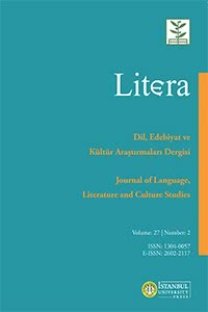Las dificultades a las que se enfrentan los turcohablantes en el aprendizaje de E/LE
Öz The aim of this study is to examine the difficulties for Turkish students while learning Spanish as a foreign language. It is also aimed to exhibit the origin of the difficulties that appear when these students intend to learn some grammar units of Spanish. The corpus of the study consists of 100 questionnaires and written exams realized by Turkish students which come from a different group of language compared to Spanish. The mentioned group has been students of Cervantes Institute in Istanbul of Level C1. The study analyzes some grammatical units and other parts of the sentence in which the Turkish speaking group repeatedly makes mistakes. The same grammar units are asked in fill in the blanks questions and also in translation skills part. The results for the same grammar topics are similar. It is also examined the effect of the difference between the students’ native language and the targeted language. Moreover some PhD Thesis and articles about Spanish learning for Turkish speakers are investigated and presented with their recommendations about the subject in the related part of the paper. The findings demonstrate that Spanish, being a Latin language is difficult to learn for the Turkish students for its distant grammar rules. To overcome the mentioned difficulties some arrangements have to be done in the Spanish as a Foreign Language classroom.
Anahtar Kelimeler:
Spanish as a Foreign Language, grammar errors, interlanguage, Turkish
___
Akyüz, Y.(1994). “Türk Eğitim Tarihinde Öğretimde Ezbercilik ve Kaynakları”. XI. Türk Tarih Kongresi, Ankara, Türk Tarih Kurumu Basımevi, 2257-2275.Çetin, S. (2016). Ser ve Estar fiillerinin kullanımlarına göre aralarındaki anlam farklılıkları, İstanbul Üniversitesi Sosyal Bilimler Enstitüsü, İstanbul.
Galán Bobadilla, A. (1994). “Análisis contrastivo y análisis de errores en el Aula de español como lengua extranjera”. en Actas del V Congreso Internacional de ASELE, 101-109.
Gürlek, L. (1998). Analisis de errores en la producción escrita de estudiantes turcos de español: Tiempos verbales- Imperfecto e Indefinido, İstanbul Üniversitesi Sosyal Bilimler Enstütüsü, İstanbul.
Hamú Haddú, E. (2013). El uso del artículo (el/ un/ Ø) en aprendices turcos de español lengua extranjera (Nivel B1), Universidad Nebrija, Madrid.
Horta Sanz, M. J. (2000). “¿Masculino o femenino? El problema del género en las clases de ELE para turcohablantes”. Cervantes, 1, 20-22.
Horta Sanz, M. J. (2002). “Problemas habituales en las clases de español para turcohablantes”. Cuadernos Cervantes, 40, 34-40.
İlgürel, M. (2008). Türk Öğrencilere İspanyolca “Subjuntivo” Kipi Öğretimi Yöntem, Sonuç ve Örneklemeleri, İstanbul Üniversitesi Sosyal Bilimler Enstitüsü, İstanbul.
Martínez González, J., Karaca, C. (2016). “İspanyolcada İyelik Yapılarının Anadili Türkçe Olan Öğrenciler (D2E) Tarafından Kullanımı -Bir Alan Çalışması-”. Ankara Üniversitesi TÖMER Dil Dergisi, Sayı: 167/2, Temmuz-Aralık, 31-44.
Moreno Cabrera, J.C. (1990). Lenguas del Mundo, Madrid, España: Visor.
Schachter, J. (1974). “An error in error analysis”. Language Learning, 27, 205-214.
Senemoğlu, O. (1987). “Yabancı Dil Öğretiminde Çıkmazlar”. Dilbilim, İstanbul Üniversitesi Edebiyat Fakültesi Yabancı Diller Eğitim Bölümü Dergisi, Núm.:7, pág. 136.
Stockwell, R., Bowen, J. y Martin. J. (1965). The grammatical structures of English and Spanish. Chicago, USA: University of Chicago Press.
Vázquez, G. (1999). ¿Errores? ¡Sin falta!. Madrid, España: Edelsa.
Yener Gökşenli, E. (2017). “Análisis contrastivo de errores en el aprendizaje de ELE de alumnos de lengua materna alemana y turca”. INNOEDUCA. International Journal of Technology and Educational Innovation, Vol.3, No: 1, 57-65.
- Yayın Aralığı: Yılda 2 Sayı
- Yayıncı: İstanbul Üniversitesi
